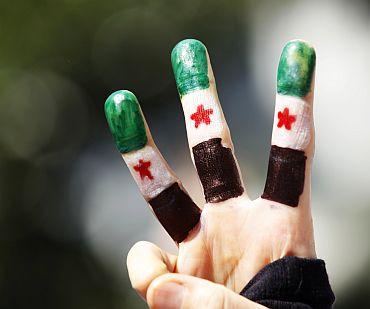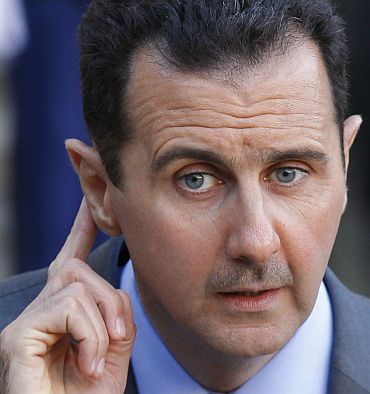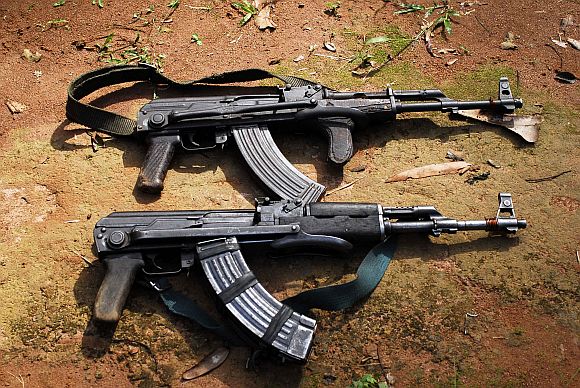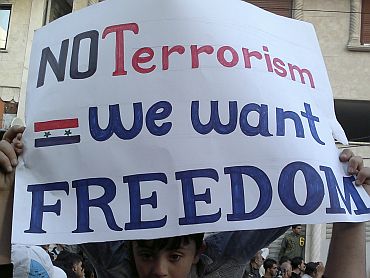 | « Back to article | Print this article |
Looking ahead at a Syria through the ballot box
The Assad government has overcome the first flush of crisis by getting the support of all sections of the people ahead of the country's first parliamentary elections. Seema Mustafa reports
The Syrian government has ushered in a new era of reforms intended more to keep its flock together than to impress the international community. Under tremendous pressure on both fronts the Assad government is in the process of implementing reforms that make way for the country's first parliamentary elections on May 7.
Banners are up on the streets of Damascus although full-fledged campaigning with street corner meetings and sloganeering is expected to pick up only when the Baath party announces its candidates in the next few days. Apart from the Baath party led coalition that is currently in power nine more political parties have registered and are in the fray for these elections.
Locals admit that these are not particularly strong at the moment but point out that "at least it is a good beginning." Shopkeepers, taxi drivers and others on the streets of Damascus responded with an "of course we will" when asked if they would cast their votes in these polls.
Click NEXT to read further...
Syrian govt working overtime to keep secular unity
The reforms include the abolition of the draconian emergency law, changes in the judicial system to accommodate these, measures to improve the system of local administration for which elections have already been held, economic measures to combat corruption, a modern law on the media allowing private houses to open newspapers and television channels, the setting up of a National Council for Media, and the laws allowing free and fair elections for the local bodies and parliament.
The entire process has been crowned by the writing of a new Constitution where the leading role of the Baath party has been replaced by a more equitable system.
Syrian leaders point out that this is the most "advanced constitution" in the Arab world as it ushers in levels of democracy still denied to the people of Egypt and other states despite the 'revolutions'. Syria's Vice Foreign Minister Faisal Mekdad was hopeful that when the people go to vote on May 7 "it will ignite a new process as we look forward to a Syria through the ballot box."
Internally, the Syrian government is working overtime to keep secular unity, with President Bashar al Assad recently pointing out that there was no difference between moderate and extremist Islam, as there was only one Islam. The Syrian government being hammered by an international media offensive has launched its own counter offensive targeting the United States, Israel, France and Saudi Arabia, Turkey and Qatar in the region. Stressing on secular unity, the government is clear that Syria is under attack because it supports the Palestinian cause and comes in the way of Israel's ambitions in the region.
Click NEXT to read further...
Inflow of arms from across the borders continues
The Assad government claims to have implemented all the six points of the Kofi Annan peace plan. Mekdad said that the government has accepted the proposal of 300 observers but retained its right to decide from which countries these would be drawn. He said that Syria had released political prisoners, withdrawn the army from the populated areas, and allowed the media into the country. However, the government had decided to blacklist Al Jazeera, Al Arabiya and France 24 "not because we do not want them here but because we cannot guarantee their security".
France that had tried to set up a communications centre at Homs in clear violation of Syrian sovereignty has again upped the ante against Syria. Interestingly, the Syrian government's recent Baba Amr military operations in Homs, sources said, were targeted at this Centre and were successful.
Core leaders of the armed groups were also arrested or killed although the inflow of arms from across the borders continues as before. The sources said that it was difficult for the Syrians to completely withdraw the Army because of the continuing offensive by the armed groups. Mekdad also suggested this saying that over a 1,000 violations of the ceasefire had taken place by the armed groups, which had used it to consolidate in the trouble spots.
The Arab League is supporting the Western offensive against Syria. President Assad accepted a mission of the Arab league earlier after considerable pressure. Arab observers from Iraq, Kuwait, Saudi Arabia, Qatar, Sudan, Algeria, Tunisia, Mauratania, Morocco were part of the mission. They were divided into groups of six to eight observers with one leader, and visited all the trouble spots as well as other parts of Syria. The report submitted by the mission confirmed rape, murder and violation of human rights by the armed groups. A furious Qatar and Saudi Arabia withdrew from the mission. Then finally the Arab League abolished the mission altogether with the report gathering dust in some corner.
Click NEXT to read further...
Most of Syria is peaceful
Mekdad was categorical that Saudi Arabia and Qatar were "sending millions of dollars to the armed groups". He said that Syria had agreed to accept 300 UN observers but retained its right to decide to draw these from countries of its choice. Russia, China, India, Brazil, South Africa are being mentioned as the favourites. The initial groups of UN observers that have toured the trouble spots are on record now saying that they had complete access to all parts of the country. Following this, the western media has put out unconfirmed reports of Syrian firing on the rebels that had led Kofi Annan to describe this as "reprehensible, if true".
In the wake of the sharp and increasingly aggressive propaganda war against Syria it has become difficult to sift the fact from the fiction. However, it is clear from even a cursory visit that the violence has been contained in a few towns; that most of Syria is peaceful; that the Assad government has overcome the first flush of crisis by getting the support of all sections of the people. Initial reservations about the tenacity of Russia and China to stay the course have been replaced by trust and confidence, with the Assad government appearing a little more stable than in October.
TOP photo features of the week
Click on MORE to see another set of PHOTO features...




